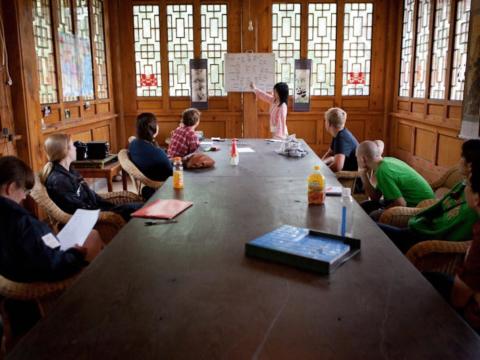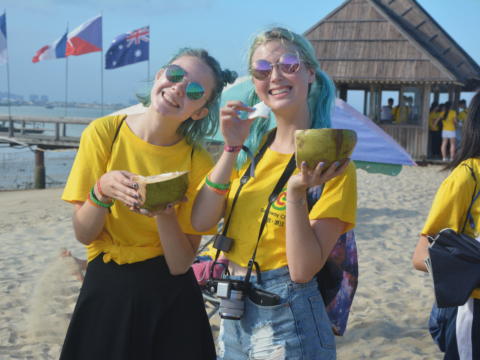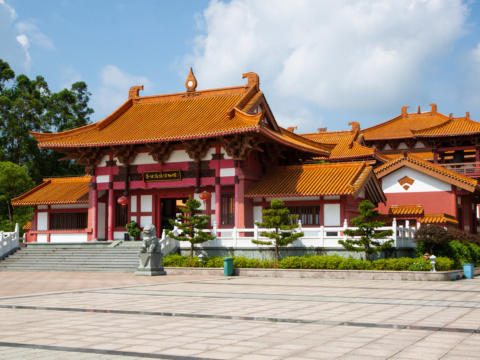Only 1,035€ per week!
Panda Conservation
Chengdu and Panda Reserve - China
Panda Conservation
Chengdu and Panda Reserve - China
Chubby black and white cute bears, chewing on bamboo, peaceful yet playful at times, it’s hard not to be charmed by the Giant Panda!
Thanks to rigorous conservation efforts and awareness, the World Wildlife Federation has declared that Pandas are no longer an “endangered” species. But they still are on the list of “vulnerable” species, which makes it important for conservation efforts to continue so that these wonders of nature can overcome the threat of extinction.
Program Description
You’ll be joining us at the Bifengxia Giant Panda base, a branch of the China Conservation & Research Center for the Giant Panda and one of the largest of its kind. It started working in 2003 and suddenly grew in 2008 when Pandas were relocated here from Wolong Panda base, which was devastated in an earthquake that year.
But since this move, the panda population here has more than doubled – which is an amazing achievement. A big share of pandas which you see anywhere in the world has originally come from this panda reserve! The panda base is now looking to releasing the panda into the wild, fulfilling its long term ambition.
If you would like to extend your Panda experience, consider adding on the Panda Wildlife and Culture program to extend your time enjoying the Panda population.
What will you get up to?
You will be involved in working about 4-6 hours a day side by side with panda caretakers by preparing food for the pandas such as apples, panda bread, carrots – and of course their favourite – bamboo, providing them food you have put together, cleaning their enclosures and ensuring they are secure in their environment.
Please note: The keepers usually feed the Panda twice in the afternoon. However, this would depend on the individual condition of each Giant Panda and also other circumstances. We cannot guarantee the feeding times and also cannot ensure that every participant would be able to feed a Panda. Feeding tasks are assigned exclusively by the keepers.
Please remember this is a rare opportunity to be in close proximity as you work for the care of these amazing animals, there is a great responsibility for providing the utmost care for them. You will not be allowed to have direct contact with the pandas for their safety and for your own. There is no touching allowed. Kindly abide by all of the rules laid out by the Panda Base staff.
Occasionally, you might also be asked to conduct some research of the panda’s habits and medical health so that we may extend our knowledge and experience in caring for this highly vulnerable species.
As a participant in this special program, you will also have the luxury of being able to walk around the panda reserve, something other visitors usually have to pay extra for. You’ll be able to see the panda nursery (approx. July to September), animal rescue, educational facilities, and much more. But please do not wander too far into the forest, and make sure to strictly obey the panda caretaker’s directions at all times for the panda’s safety as well as your own!
You will be required to be committed to your work, but let the panda caretaker or coordinator know if you cannot keep to the schedule ahead of time and you’ll have a great time with these incredible, beautiful creatures.
But remember: Pandas are wild animals and naturally lazy and and will need some time to relax on their own!
That’s why we offer plenty of Chinese lessons & cultural activities during their resting times, which you can take part in at your leisure. Some activities that you will take part in are:
- Chinese language lessons (Daily 16:00-18:00 upon request)
- Mahjong (Chinese chess)
- Chinese calligraphy
- Papercraft
- Dumpling making
- And more!
***Take note that the duration of this program is limited to one week bookings only***
Aims & Objectives
- Give you practical, hands-on experience in animal conservation
- Assist the program and its staff with your efforts
- Give you the chance to learn about, and bond with the Pandas
Schedule
Monday (Chengdu)
- Breakfast
- Visit Chengdu Panda Breeding Center
- Lunch
- A walking tour through Chengdu City, visit the Tianfu Square, People’s park and the famous ancient pedestrian street of Kuan-zhai Alley
- Welcome Dinner at a local hot pot restaurant
Tuesday (Panda Reserve)
- Breakfast
- Transfer to the Panda reserve (approx. 3 hours by public bus)
- Lunch at the Panda Reserve Hostel
- Orientation: Meet the team of the Panda Reserve and introduce yourself. Understand the rules and regulations, Read and sign the security agreements, watch a safety training video. Get the working manuals and assignments as well as information about the tasks you will carry out during the next days.
- Registration followed by issue of uniforms, participant card etc.
- Form working groups. Each group will then elect a ‘Group Leader’
- Dinner
- Chinese lesson (optional)
Wednesday (Panda Reserve)
- Breakfast
- Meet at the Gate of the Panda base at 8:40. A staff member will lead your group to your respective places of work.
- You should finish your tasks under the Panda keepers’ guidance, such as cleaning the Panda house and feeding the Panda. Tasks are decided on by the Panda keepers
- During the break, you should fill in the form “My Panda and I”.
- After completing the morning tasks, meet at the participant service center
- Staff will lead you to the Canteen for Lunch
- After Lunch, you will return to the participant service center. You can take a rest or choose to watch a documentary about the Giant Panda.
- Split into groups and make Panda cake in turns. Panda cake is a form of food for Pandas prepared from fresh ingredients.
- Free time, you can proceed to complete the assignments if any or assist the staff if required
- Finish your tasks for the day and have free time
- Free time or join in to making dumplings. Learn the secret behind tasty Chinese dumplings.
- Dinner
- Free time. Optionally you can watch some “Panda Videos” or take a rest.
Thursday (Panda Reserve)
- Breakfast
- If there’s 10 or more participants: Support the Panda reserve staff in simple research activities. These vary depending on need.
- If there’s less than 10 participants: Prepare food for the Pandas and feed them.
- A short break, then meet at the participant service center
- Staff will lead you to the canteen for lunch
- Post Lunch, return to the service center and choose to take rest or continue to watch a documentary about the Giant Panda.
- Return to where you worked the day before and feed the Panda under the keepers’ guidance.
- During the break please complete the “My Panda and I” form and any other related assignments.
- Complete your tasks for the day
- Free time or join our Chinese Calligraphy lessons. Learn the technique of drawing beautiful Chinese characters on paper.
- Dinner
- Free time or you can spend your evening learning how to play Mahjong and have fun challenging your opponents. There is no doubt that once you get hooked on Mahjong it’s difficult to let go of it.
Friday (Panda Reserve)
- If there’s 10 or more participants: The Giant Pandas eats between 10 and 20 kilos of bamboo per day. Support the staff to plant more of it to ensure there’s enough food.
- If there’s less than 10 participants: Prepare food for the Pandas and feed them.
- A short break, then meet at the participant service center
- Staff will lead you to the canteen for lunch
- Post lunch, return to the service center and choose to take rest or continue to watch a documentary about the Giant Panda.
- Return to where you worked the day before and feed the Panda under the keepers’ guidance.
- Your time at the Panda base is over. Return your work uniform, participant card and gloves at the service center and also submit the "My panda and I " form.
- Summary meeting: Share your work experience with the others. Thereafter, the staff will issue certificates to everybody. Later, you can leave a message on the “Love wall”.
- All the participants and staff take a photo in front of the service center. Later the photo will be sent to you by email.
- Free time. Optionally we arrange a visit to a local temple (Bifeng Temple).
- If you need to return to Chengdu early, e.g. for catching your flight on Saturday morning, now is the time. Our coordinator can help arrange your bus and a hostel in Chengdu at your cost.
- Dinner
- You can choose to end your last day of stay at the Panda Base with a taste of Chinese cinema, watch a Chinese movie together at the activity room. Or you can choose to pack your things and get enough rest before your return journey.
Saturday (Chengdu)
- After breakfast around 8:30 you will be transferred to Chengdu city or airport. If you decide to leave at a different time you will need to arrange and pay your own transport.
- If this is the last week of your program (around Chengdu) it’s time for you to say goodbye. You will arrive at the airport around noon. Late afternoon flights are recommended to be on time!
- Otherwise stay in Chengdu to connect to your next program.
Note: This schedule can be changed and/or amended depending on weather conditions, local conditions and unforeseen circumstances.
Participant Criteria & Requirements
Standard Requirements
Minimum age: 12
Maximum age: 60
Minimum English level: Basic
CRB required: On Signup
Passport copy required: No
Resume copy required: No
Required qualification: None
Additional Requirements
There are no further requirements for this program.
Additional Equipment
- Mountain weather is unpredictable, so waterproof shoes/rain jacket are recommended.
- Depending on the time of year and weather, casual and loose fitting clothes are a good choice. Also, please bring some comfortable trainers/sneakers for your leisure time and decent boots to work at the panda base.
- Winter time may get quite cold. Warm cloths are needed.
Location
Chengdu is the capital of Sichuan Province of China and also one among the three most populous cities in Western China. Chengdu is one of the most important economic, financial, commercial, cultural, transportation and communication centers in Western China.
Chengdu also had the reputation of being ranked among one of the most livable cities in China, with bustling streets, new magnificent buildings, historical towns, beautiful monasteries.
About the Accommodation
Your room will be in a hostel located in the center of Chengdu city. It features colourful accommodation and offers a tour desk, a garden, a shared lounge, a bar and a restaurant.
There is also a desk, electric kettle, hairdryer and the bathroom comes with free toiletries and slippers.
Note: Limited Comfort Rooms available. Please contact us to confirm availability
Food Arrangements
Your meals will typically be Chinese dishes common of the local area, comprising mainly rice, noodles and vegetables with some meat.
Facilities
Transportation
The accommodation is just a 10-minute walk away from airport shuttle bus station and only a 5-minute walk from Huaxiba Subway Station (line 1).
Shops
The hostel is located in the city and so all amenities are located within walking distance. Shops are open from 10:00 to 22:00 in Chengdu city, Monday to Sunday.
Money
If heading to the Panda reserve, remember Chengdu might be your last chance to withdraw money, as the nearest ATM that accepts international bank or credit cards is an hour away by car from the Panda Base.
Activities & Events
No scheduled activities outside the program.
Sights & Surroundings
Like any major city, Chengdu has a lot to offer in terms of things to do and see. Although a guidebook can tell you everything you would need to know, here are a few ideas we recommend:
Jinli Street
This is a commercial pedestrian street described as being representative of the city. Here you will find plenty of shops and street food
Wuhou Temple
Located near to Jinli street, this temple complex provides the perfect antidote to the hustle and bustle found so close.
Mount Qingcheng
One of the most famous Taoist mountains in China at the top of which you will find Laojun Pavilion.
Bullet Train
Keep in mind that with the new High Speed Train service operating between Chengdu and Guilin, you can now make the trip that was once a 24hr journey in just 8 hours! China’s newest high speed trains, also known as bullet or fast trains, can reach 300 km/h (186 mph), or a top speed of 350 km/h (217 mph). That means you have many new options, for combining programs in a variety of locations. The route, along this super fast and technologically-advanced train, couples a comfortable ride adventure with breathtaking scenery, in a way that should not be missed. So… All aboard!
Transportation
From this location we provide free transport to your next program at the following location(s):
- Panda Reserve
- West Sichuan
- Ya'an
Location
Situated in the center of the Sichuan Province Ya'an is located in the upper reaches of the Yangtze River. It is bounded on the east by Chengdu, by Garze in the west, with Liangshan and Aba bordering south and north.
You will be staying in the Panda reserve and research center (approx. 40 minutes’ drive from Ya'an city). It is very large and enclosed in the highlands of Bifengxia, a beautiful mountain area with a uniquely remote charm. You’ll be surrounded by nature, cool fresh air…and pandas of course! It is located 1100 metres above sea level in sub-tropical climatic conditions such as lots of rain and an average temperature of 15 degrees. Perfect for the pandas – and for you!
About the Accommodation
Accommodation is in a pleasant, cozy, recently renovated hostel. You will stay in twin rooms with TV and an electric blanket. There is a common room here that is popular for parties, movies screenings and purchasing cold drinks as well as playing Chinese chess, Mahjong…and more!
There’s also an activity room where you can learn about the Chinese language, Chinese Calligraphy, Paper craft etc. There’s a book cabinet there with books in different languages. But we’d love it if you brought a few from home to leave for others!
Whilst at the panda base, our standard accommodation are twin bedrooms with bathroom facilities. You can still choose to upgrade in the same hostel to a private room with western toilet, or to a room with air conditioning. This option may be particularly attractive to participants with some extra budget and who choose to spend that on ‘home-like comforts’. Upgrades depend on availability and are to be paid on-site.
Food Arrangements
Your meals will typically be Chinese dishes common of the local area, comprising mainly rice, noodles and vegetables with some meat. Some westerners not used to Asia may find the diet lacks the variety to which they are accustomed – but it is the local diet.
Facilities
Transportation
The centre is in easy walking distance of where you will be working. You will be 16 km from Ya’an City (literally translated: “elegant and quiet city”) which is an easy half hour bus ride from the Panda Reserve. You will be 150 km from Chengdu. Every half-hour there are buses from Ya’an to Chengdu.
Shops
There are many small local stores in the Panda Reserve which serve fizzy drinks, snacks and ice creams. A greater range of shops including supermarkets and pharmacies are available in Ya'an.
Money
There are not many opportunities to spend your money at the Reserve. So around 200 Yuan a week should be more than enough.
You may however need money for ‘extras’ such as self-organized weekend trips, and taking pictures of the Pandas. The Panda Reserve asks for 'donations' for taking pictures of the pandas, which can be quite expensive.
You should note that the nearest ATM that accepts international bank or credit cards is an hour away by car so if you have such plans, you would need to cash out at the airport upon your arrival or in Chengdu when you are there.
Activities & Events
No scheduled activities outside the program.
Sights & Surroundings
On weekends, you may like to go further afield, and our co-ordinator will be happy to help you to plan for this. The ’top’ things to do are:
Trekking
Take one of the many walking routes, and even fish in one of the ponds along the hiking routes around the Reserve.
Hot Spring Resort
Visit the Hot Spring resort about 1 hour from the Reserve (cost is approx. 400 Yuan by private car/taxi). One of the pools even has fish that will nibble at your feet whilst you’re bathing!
Ya’an City
Visit the City of Ya’an (40 minutes by taxi) for shopping and general sightseeing, especially the famous bridge of Ya’an
Chengdu City
Visit one of the many parks in Chengdu, have a drink on the river, eat the traditional Sichuan Hot Pot and watch the locals play Mahjong and even get a massage!
Yangtze River Cruise
Take the Yangtze River Cruise (this takes in the 3 river gorges and it is well worth the trip! However, it takes 3 days at least so you may like to time this activity in advance.
Sichuan Opera
Visit the Sichuan opera with its traditional ’face changing’ masks. A highly entertaining cultural experience!
Transportation
From this location we provide free transport to your next program at the following location(s):
- Chengdu
- West Sichuan
- Ya'an
Quick Facts
Name: People’s Republic of China
Population: 1.37 billion
Capital: Beijing
Language: Standard Chinese
Currency: Renminbi (Yuan) (CNY)
Time zone: CST (UTC +8)
Country Information
China covers approximately 9.6 million square kilometers making it the 2nd largest country by land area. It is not only the country with the largest population in the world but it is also one of the largest economies laying claim to being the world’s largest exporter and 2nd largest importer of goods.
It is a country of incredible cultural history boasting one of the earliest ancient civilisations dating back to around 2800 BC. Its landscape is equally rich in diversity, ranging from its forest steppes, its deserts in the north and subtropical forests in the south to its 14,500km long stretch of Pacific Ocean coastline. All of this makes China an incredible and exciting place to be, both in what it has to offer today and the story of its past.
Climate
Due to the vast expanse of land that China covers both in terms of longitude and latitude, the climate varies greatly from place to place. Generally, the climate pattern in China is characterised by dry seasons and wet monsoons. The rainy seasons mainly span from May to september but this pattern is less consistent in the some areas such as the dry northwest.
The difference in season causes a pronounced disparity in temperatures between winter and summer. Whilst the summer offers warm temperatures almost everywhere, the winter can cause temperatures to drop significantly, especially in the northern areas of China.
The Monsoon
The southern provinces start to experience the monsoons first, starting in April and May. The winds start to blow north in June meaning that northern provinces receive the rains around July and August, and the rains start to come to an end in September and are generally completely over in October. The northwest of China is the only area that avoids the monsoon climate.
Culture
China is one of four great ancient civilizations with 3,600 years of written history, and its culture both past and present is incredibly profound. Whilst Chinese cultural identity has many common, unifying elements, it is a country that represents 56 ethnic minority groups, the largest of which is the Han Chinese (900 million people), with other groups including the Tibetans, Mongols, Naxi etc. The significance of this is that each group to an extent creates their own culture and so within the vast expanse of China, depending on where you are, cultural variety is plentiful and there to be explored!
The country is currently ruled by The Chinese Communist Party. It is officially atheist, but is slowly and surely becoming more tolerant towards the practice of religion. The five official religions in China are Buddhism, Taoism, Islam, Catholicism and Protestantism. Due to the fact that it is only in recent years that tolerance of religion has made any progress, the practice of other religions is not formally recognised, although are often tolerated especially in the case of ancient Chinese beliefs. Currently about a quarter of the population practice Taoism, Confucianism and other traditional religions.
Gastronomy
There are 8 different styles of traditional Chinese cuisine, and traditional food can be found everywhere in China. Other styles adopted into Chinese cuisine and that might be found in China include Singaporean, Malaysian, Indonesian, Indian and American cuisine.
The staple foods used in Chinese cooking include exactly what you would expect: rice, noodles, and vegetables with sauces and seasonings.
The attitude regarding food in China is generally “waste not, want not” meaning that it not just uses a wide variety of both plants and animals, but every part of these plants and animals are used in some way. For westerners this might mean that there are a few things on the menu that you may not be used to and might want to avoid.
Due to the scale of the country, it isn't surprising that each area of China has a unique style of cooking and the ingredients very much depend on the natural agricultural produce of the specific region. For example the south of China uses far more rice than the north, where wheat is its main ingredient, a reason why noodles and dumplings are much more common. Southern food is also typically more spicy than that of the north.
Common Chinese dishes include: Sweet and Sour Pork, Gong Bao Chicken, Ma Po Tofu, Wontons, Dumplings, Chow Mein, Peking Roasted Duck and Spring Rolls
Transportation
Like its economy, China’s transportation network has rapidly expanded over recent years and now houses the longest road network in the world as well as the busiest train network
Air
Although the most expensive means of transportation, it is by far the most convenient and can save a lot of time travelling the longer distances across China.
The main ports of air travel are Beijing, Shanghai, Guangzhou and Hong Kong although all major cities within the country host domestic flights.
Rail
This is the primary mode of transportation in China and most major cities have their own metro systems. As well as its standard vast rail network, China boasts over 7000 km of high-speed rail.
Bus
For local travel, buses are a very affordable way of getting around and a good alternative mode of transport where metro is not available.
Taxi
Taxis are generally cheap and easy to find. Meters are generally used in towns and cities. If your driver does not want to use a meter, common for longer trips out of town, be sure to negotiate a price before the journey.
Other Alternatives
Motor pedicabs, pedicabs and motorbikes can all be found in China and are a cheap way of getting around. We recommend you set a price before using this form of transport.





